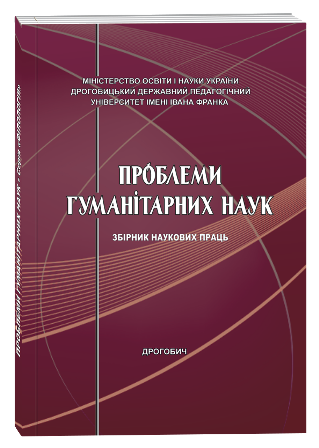LINGUISTICS OF EMOTIONS: THE FORMATION STAGES (RESEARCH THEORIES, SCIENTIFIC SCHOOLS, PERSONALITIES)
DOI:
https://doi.org/10.24919/2522-4557.2019.44.187599Keywords:
linguistics of emotions; formation stages; philosophic currents; ethnic and individual emotionality; peoples’ psychologyAbstract
The article focuses on the analysis of the formation stages, research theories of linguistics of emotions. It has been elucidated that linguistics of emotions is formed on the border of different sciences: linguo-philosophy, taking into account semantics, pragmatics, psycholinguistics, linguo-culturology, linguo-conceptology, ethno-linguistics, gender linguistics, etc. It has been highlighted that linguistics of emotions fixates the expression of an ethnic and individual emotionality; it takes into account the auto-interpretation of emotions and feelings, which is manifested in different speech styles or the system of discursive practices. Linguistics of emotions aims at understanding the world of emotions through the language, not simply as the phenomena and facts accumulation, but as the very understanding of these facts and phenomena. As a result of the philosophers’ reflections on the essence of the emotions’ nature two trends were formed: intellectualist (I.F. Herbart) and sensualist. O. Potebnya and W. Wundt were at the origin of psycholinguistics and, accordingly, linguistics of emotions.
References
Анохин, П. (1979). Системные механизмы высшей нервной деятельности. Взято з http://zooton.net/ind1026.html.
Арнольд, М. (1960). Когнитивистские теории эмоций. Взято c http://studopedia.org/ 1-138962.html.
Булаховський, Л.А. (1975). Вибрані праці. І.К. Білодід, Ю.Л. Булаховська, & В.А. Дибо (Ред.). (T. 1–5; Т. 1). Київ: Наукова думка.
Вундт, В. (1984). Психология душевных волнений. В В.К. Вилюнаса & Ю.Б. Геппен-рейтер (Ред.), Психология эмоций (с. 47–63). Москва: МГУ.
Дарвин, Ч. (1953). Выражение эмоций у животных и человека (Т. 5). Москва: Изд. АН СССР. Взято c http://vivovoco.astronet.ru.
Гербарт, И.Ф. (2007). Психология. Москва: Издательский дом Территория будущего.
Изард, К. (1999). Психология эмоций. Санкт-Петербург: Издательство Питер.
Космеда, Т.А. (2012). Ego і Alter Ego Тараса Шевченка в комунікативному просторі щоденникового дискурсу. Дрогобич: Коло.
Потебня, А.А. (1993). Мысль и язык. Киев: СИНТО.
Симонов, П. (б.г.). Информационная теория эмоций. Взято c http://math.nsc.ru/AP/. Chapter_9_84.htm.
Фрейд, З. (1975). По ту сторону принципа удовольствия. Взято c http://osp.kgsu.ru/li brary/PDF/398.pdf.
Шаховский, В.И. (2010). Эмоции: долингвистика, лингвистика, лингвокультурология. Москва: Книжный дом ЛИБРОКОМ.
Lange, J. (n.d.). Peripheric theory. Retrieved from http://sites.google.com/site/psihologii emocij/istoria-psihologii.



